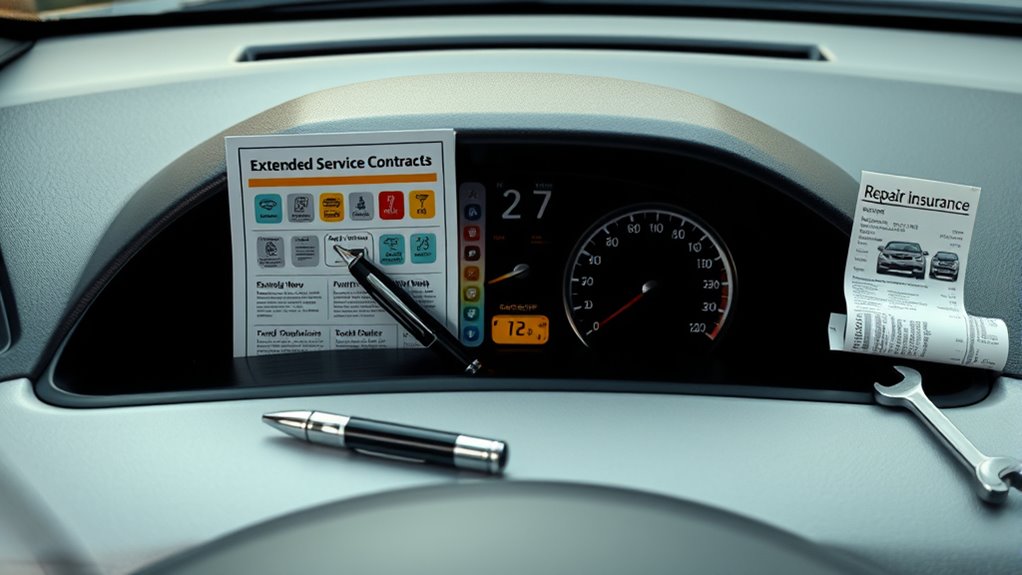When comparing extended service contracts and repair insurance, you should consider costs, coverage, and provider reputation. Service contracts often come from manufacturers and may cover major repairs, while repair insurance typically offers broader protection through third-party plans. Be sure to review what’s included, deductibles, and any restrictions or exclusions, as these affect value and convenience. To make the best choice fitting your needs, exploring further will reveal important details to help you decide wisely.
Key Takeaways
- Extended service contracts often cover repairs beyond the manufacturer’s warranty, while repair insurance may focus on specific damages or breakdowns.
- Costs vary widely; contracts may have deductibles or service fees, and coverage length impacts overall value.
- Manufacturer plans typically offer authorized repairs, whereas third-party options may have variable quality and coverage limitations.
- Reading the fine print is essential to understand exclusions, repair shop restrictions, and whether major repairs are included.
- Consider provider reputation, coverage comprehensiveness, and flexibility to choose repair locations when comparing options.

When doing a cost comparison, consider how much you’ll pay upfront for the extended service contract versus potential repair costs without coverage. Extended warranties can range widely in price, depending on the item, coverage length, and provider. While they might seem costly at first, they can save you money if the item develops issues later on. However, some contracts come with deductibles, service fees, or exclusions that can add to your expenses, so read the fine print carefully. Also, research whether the contract covers major repairs or just routine maintenance, as that markedly impacts its value. Sometimes, the cheapest plan isn’t the best, especially if it offers limited coverage or has high out-of-pocket costs. It’s also important to consider coverage limitations because they can significantly affect the overall benefit of the plan. You should also compare the reputation of the providers offering these plans. Manufacturer coverage is typically straightforward, with repairs handled by authorized service centers, ensuring quality and compatibility. Extended service contracts may be offered by third-party companies, which can sometimes have less stringent standards or customer service issues. It’s worth checking reviews, reputation, and the fine print of these plans before committing. Moreover, consider how flexible each option is—can you choose your repair shops? Are there restrictions on where repairs can be performed? These factors influence the overall value of the coverage.
Frequently Asked Questions
Can I Purchase Extended Service Contracts After My Warranty Expires?
Yes, you can purchase extended service contracts after your warranty expires. Many providers offer extended coverage options that you can buy even after the original warranty ends. Keep in mind, some plans may require a contract renewal or assessment of your device’s condition. Act quickly to secure coverage, as waiting too long might limit your choices. Always review the terms to make certain the extended coverage fits your needs.
Are There Any Cancellations or Refunds Available for These Plans?
Yes, you can often cancel these plans, but refund policies and cancellation procedures vary by provider. Usually, you need to request cancellation within a specific time frame, sometimes within a cooling-off period. Be sure to review your plan’s terms to understand if you’re eligible for a refund and how to initiate the process. Always contact customer service directly to confirm your options and guarantee a smooth cancellation.
Do These Plans Cover Pre-Existing Issues or Only New Problems?
Hold onto your hat, because coverage limitations vary widely. Generally, these plans don’t cover pre-existing conditions unless specified. They usually only cover new problems that arise after you buy the plan. If you’re concerned about pre-existing issues, check the fine print carefully. Some plans may exclude pre-existing conditions altogether, so it’s wise to ask upfront. Don’t expect coverage for issues you had before purchasing, so plan accordingly.
How Do Claims Process Differ Between Contracts and Insurance?
When you file claims with contracts, the claim filing procedures are straightforward, often requiring you to submit specific documents quickly. The claim approval process is usually faster since contracts typically have predefined coverage and fewer restrictions. In contrast, repair insurance may involve a more detailed review, with a longer claim approval process. You might need to provide additional proof, and approval can take more time before repairs are authorized.
Are There Any Age or Mileage Restrictions for Coverage?
Yes, there are often age limits and mileage caps for coverage. You might discover that some plans restrict coverage if your vehicle surpasses a certain age or mileage, typically around 8-10 years or 150,000 miles. It’s important to review these restrictions carefully because they can impact your eligibility and how much protection you’ll get. Always check the specific policy details to ensure they fit your vehicle’s age and mileage.
Conclusion
Just like the wise owl guarding its nest, choosing between extended service contracts and repair insurance depends on your needs. Think of extended contracts as a shield, offering peace of mind for costly repairs, while repair insurance acts like a safety net, catching surprises. By understanding their roles, you can navigate your options confidently, ensuring your investment stays protected—because, in the end, knowledge is your best armor against unexpected breakdowns.









